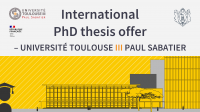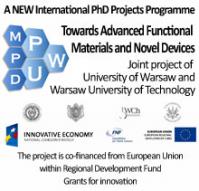International PhD thesis offer
Co-supervisors
- Jérôme LAUNAY (LAAS-CNRS, University Toulouse III Paul Sabatier – France)
- Wojciech WRÓBLEWSKI (Faculty of Chemistry, Warsaw University of Technology – Poland)
Period: autumn 2024 to autumn 2027
Location: work carried out mainly in France (LAAS-CNRS, University Toulouse III Paul Sabatier)
Thesis grant: 2,000 to 2,300 euros gross per month
Contacts: jlaunay@laas.fr and wojciech.wroblewski@pw.edu.pl
Description of PhD thesis topic:
Development of electrochemical microsensors with integrated all-solid-state reference electrode for nitrate ions detection in freshwater
With the development of intensive agriculture and the massive use of nitrogen fertilizers and slurry, surplus of nitrate anions contained in soils either leach into groundwater or run off into nearby watercourses, constituting a major source of pollution. In France, 66% of nitrates in surface and groundwater come from intensive farming. Legislation sets the quality limit for nitrates in drinking water at 50 mg/L. However, nitrate concentrations still exceed this limit in some catchment areas. In addition, to avoid eutrophication, nitrate levels in the aquatic environments concerned must not exceed 15 mg/L.
Various analytical techniques can be used to determine nitrate levels in water, soil or food, including UV spectroscopy, chromatography and capillary electrophoresis. Most of these methods require expensive equipment and complex, meticulous sample preparation. Electrochemical methods are becoming increasingly popular, as they offer a number of advantages. They are non-destructive to the sample, easy to miniaturize, inexpensive, simple, fast and high-performance in terms of sensitivity and selectivity.
The aim of the PhD project is to develop electrochemical microsystems for nitrate ions detection, based on amperometric sensors, using electrochemical microcells, and potentiometric sensors, using ion-sensitive transistors (ISFETs) or miniaturized solid-state electrodes. The studies will involve defining and integrating functionalized layers on solid transducers to optimize the selectivity and sensitivity of nitrate ions detection. Interfacial transduction layers (conductive polymers, nanomaterials) will be introduced to improve the signal stability as well as to extend the lifetime of sensors. Finally, this work will be completed by the realization of a stable, all-solid-state reference electrode in order to achieve a fully integrated, autonomous microsystem.
This type of microsensors has been developed in the past at LAAS in France. An international collaboration will enable us to combine skills in detection microsystems and functionalization chemistry within the framework of a doctoral co-supervision.
Watch a video about the university»



